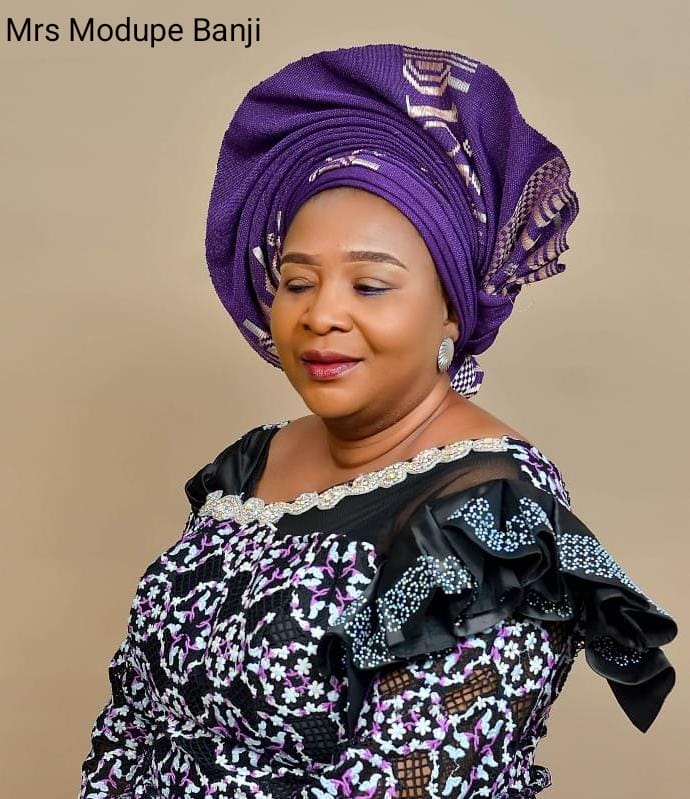
Mrs Modupe Abiodun Banji (nee Oyemade) was born, on 25th December, 1961. She is the first child of Barrister Adesola Oyeladun Oyemade and Mrs Mojisola Oyemade.
She started formal schooling, in 1966, at The Apostolic Primary School, Ile-Ife. She then attended Origbo Community High School, Ipetumodu and Our Lady’s High School, Modakeke, Ife. She completed her secondary education, in 1980. Thereafter, she attended Wesley Guild Nursing School, Ilesha, from 1980 to 1981; but moved on, to Oyo State College of Education, Ilesha, from 1981 to 1984; and obtained the National Certificate of Education (NCE) in Fine Art, a course that has made adire- making one of my main passions, to date. In furtherance of my pursuit of formal education, I attended Obafemi Awolowo University, Ile-Ife; and obtained the degree of B.A. Fine Art (Textile Design), in 1997.
Modupe Banji - From 1984 to 1985, I was on national service, as a member of the National Youth Service Corps (NYSC). For a total of sixteen years, I taught at several secondary education institutions, such as St Mark’s Secondary School, Osogbo; Ode-Omu High School, Ode-Omu; and Oke-Ibadan High School, Ibadan. Thereafter, for five years, I was the Principal Education Officer, at the National Commission for Museums and Monuments, Osogbo; and retired, as Chief Education Officer, from the Commission, in 2006.
My remit, at the Commission, included organising annual International Museum Day. Following my retirement, I moved to the United Kingdom, in 2008; and lived, with my spouse and children, in Cardiff, until 2014. My spouse and I moved to Nigeria, in 2014, to work at Bowen University, Iwo. In 2019, in conjunction with the Department of Business Administration, at the university, I organised an event, titled The Effects of Globalisation on Nigerian Culture. The effects are many and varied. The guest speakers, at the event, were Oba Adedokun Abolarin of Oke- Ila-Orangun and the renowned journalist, Bashand global relevance, intra-nationally and internationally, are custodians of Nigerian culture, as well as cherished and revered channels of the globalisation of it.
Globalisation has enabled the exportation and importation of elements of the much-faceted nature of Nigerian culture, in terms of food, clothing and religion, among others. Globalisation has enabled the projection of Nigerian culture, within and outside the geographical boundaries of the country. Intranationally, Nigerian sub-cultures have become global, with different sub-cultures, such as Igbo, Hausa and Yoruba, projecting their elements into one another. Internationally, elements of Nigerian sub-cultures are exported to other countries, such as the United Kingdom and the United States of America.
Modupe Banji is happily married to Dr Theophilus Ayo-Oluwa Banji. The marriage, which was solemnized, in Nigeria, in 1988, is blessed with three children: Emmanuel, James and John, all of whom have enjoyed extensive exposure to elements of British and Nigerian cultures, having lived for many years, in both countries. Dr Banji, who is now retired, has worked as a lecturer for most of his adult life. He has taught at two Nigerian universities (Obafemi Awolowo University, Ile-Ife; and Bowen University, Iwo). In the United Kingdom, he has taught, at a number of universities, such as Cardiff University, University of Roehampton, University of East London and Glamorgan University (now University of South Wales). He was also an Adjunct Instructor on the ‘Communication for Leadership’ Master’s programme at Gonzaga University in Spokane, Washington State, United States of America.




